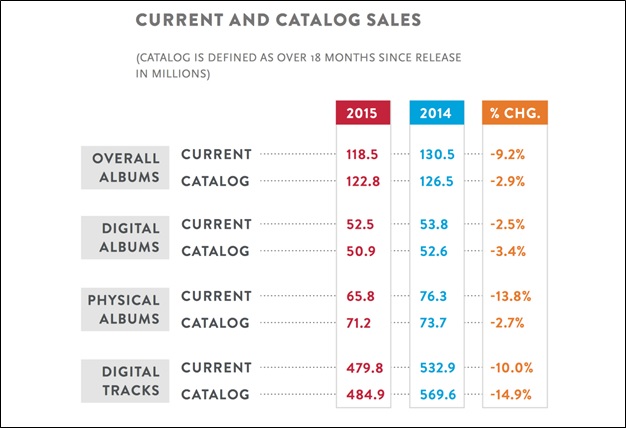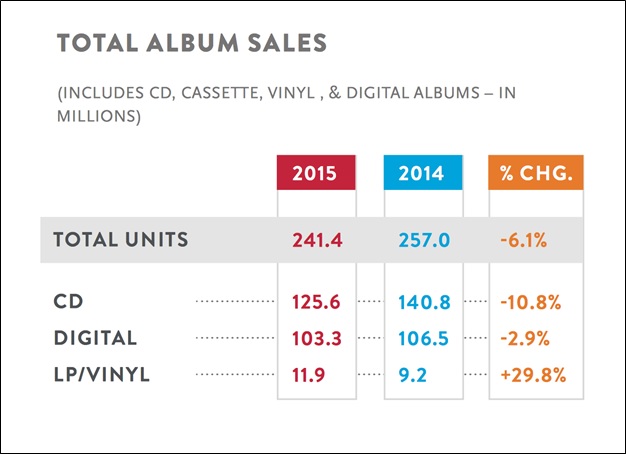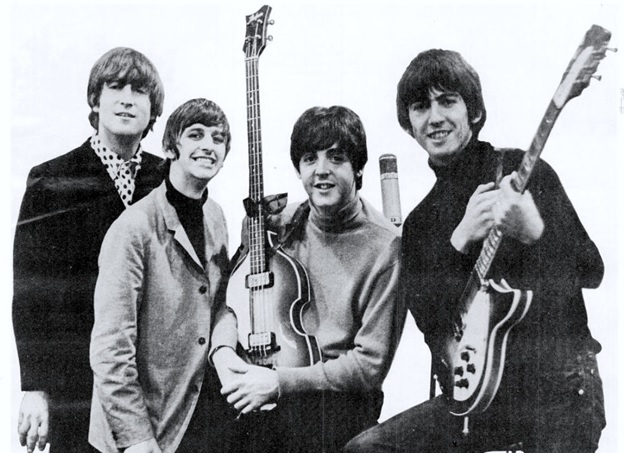There was a lot of buzz last week about some new Nielsen numbers – no, not the Christmas music radio ratings – but the 2015 music sales totals.
It turns out that for the first time in history (think about that), old music is outselling new music. Now let’s get our terms straight. “Catalog” music is defined by Nielsen as anything 18 months ago or older.
But the main thrust of the Nielsen data shouldn’t be lost on any of us – especially those programming and managing radio stations that play new music from any genre. For myriad reasons – in spite of Adele’s amazing run near the end of 2015 – the old stuff trumped new music for the first time ever:

The only exception was in digital albums, but in every other category, it was all about the vintage stuff. And when you drill down further into the various formats that make up album sales, you see a downturn for digital and CDs, but a continuing rise for vinyl.

As the chart clearly shows, the vinyl comeback – while modest in the big picture – represents the only category of music sales showing increases. We saw evidence of vinyl’s resurgence at CES. There were more than a few turntables on display (as well as more high-end audio equipment).
And of course, logic dictates that most of those vinyl sales are going to be older albums that consumers wish to enjoy in the format in which they were originally released. But sales of old school record albums doesn’t tell the entire tale, especially when you consider they made up only 5% of the overall totals with under 12 million units sold.
So something else has to be going on. The site, Chart Attack (you have to love that name), also considers vinyl as a possible culprit. They point the speculative finger at on-demand streaming services like Spotify as another sign that consumers are moving away from music ownership.
But that doesn’t necessarily explain the rise in interest in catalog music. So digging a bit deeper into the Nielsen data reveals another theory that would seem to hold water.
The Beatles may have had an even greater influence on behavior than Adele’s all-out attack. Their appeal (as we’ve learned from the resurgence of Classic Rock ratings) isn’t limited to Baby Boomers. Nielsen reports that among 18-34 year-olds, those lads from Liverpool are the seventh most popular artist – ahead of Katy Perry, Kelly Clarkson, and Usher.
But here’s the part of the Nielsen data that needs a little dot-connecting. Consider:
1. An all-time weekly streaming record was set the week of December 24th with nearly 7.5 billion on-demand streams – none of it attributable to Adele.
2. And when was the Beatles catalog released for streaming? On December 24th. And that event also coincided with a nearly 90% increase in radio airplay for the Fab Four.
The streaming Beatles phenomenon was more than just about commerce. It had a strategic purpose, too, and one that should not be lost on radio executives, grappling with their own digital direction.
AdWeek notes that Universal Music Group – the Beatles’ shareholders – made an exceptionally wise move by releasing their catalog to the streamosphere. Aside from streaming being the shortest path to reaching Millennials, the CEO of BrandFire, Adam Padilla, put it best:
“If young people don’t adopt The Beatles as their own, on their terms and on their devices, what was once a prized commodity rapidly becomes a relic.”
He was talking about the immense value and history of the world’s most successful rock band. But he could have just as easily been talking about radio.
Yeah, yeah, yeah.
- What To Do If Your Radio Station Goes Through A Midlife Crisis - April 25, 2025
- A 2020 Lesson?It Could All Be Gone In A Flash - April 24, 2025
- How AI Can Give Radio Personalities More…PERSONALITY - April 23, 2025





“Play the Hits!” There are many in all multiple formats that are more than “Oh, Wow!” And, think Boomer Dollars. Ready when you are. Thanks, Fred.
Always appreciated, Clark.
This is my FAVORITE JacoBLOG of the year. Hmmm. Wonder why?
Of course…they’ve been my fave band for eons. Thanks for passing this along, Fred.
And for any of those CLASSIC ROCK or CLASSIC HITS stations(or any stations, for that matter)looking for a way to boost their weekly Beatles tallies, perhaps they should contact me about airing my 1-hour show called #BeatlesWeekly!
P.S. I love my job(s)!
The Beatles, the gift that keeps on giving.
Bowie had his first #1 album post humously. The Baby Boom is demographicaly set to create a longer list of passing superstars naturally which will in turn create a well documented change in the way an artist is percieved positively forever (Elvis, Tupac, Michael Jackson etc). Formats that can pivot naturally between new music and address an inevitable retro musical interest growth ahead on the same channel, will be in an ideal place for the foreseeable future as the list of musical superstars no longer among us, grows at a more rapid pace than at most other times in music history due to the size and impact of the large Baby Boom generation and their even larger impact on music.
This is sad to me, I wish he would have been alive for this #1….but, he had so much success, he was an amazing talent!
Roy, thanks for the comment. Clearly, Boomers have a generational edge because the vast majority of their music listening was done communally – on the radio, in dorm rooms, etc. It is much more difficult for Millennials to have that shared experience as music becomes so highly personalized and customized.
I don’t think it will ever replace new music discovery, but does new music discovery have to be new music, I don’t think so. Perhaps the Millennials, outnumbering of the Baby Boomers, appreciate the quality and value of the music that Mom and Dad, Grandma and Grandpa listened to, and again maybe it’s new music discovery to many because the catalog is monstrous and rich! Not to mention the popularity of Vinyl, either way, it’s good to see!…Let’s not forget PRODUCT PLACEMENT, Commercials, TV show, Movies utilize a great many musical stylings because it fits the mood or scene or product or message. Something publishers have been aware of since the beginning of recorded music!
https://www.census.gov/newsroom/press-releases/2015/cb15-113.html
Just some thoughts!
There’s no question, Billy, that music is exposed in a variety of ways in 2016. And you mention a number of these. We see this as well in our Techsurveys. Thanks for the comment.
Hi Fred —
This is a rare case where I don’t share your ‘take’. I look at that table and see “catalog” dropping across the board — just dropping more slowly than “current.” I don’t see how “catalog fell less” means it is “succeeding” in your eyes. It’s a bit like saying: “Our team fell way back in the standings, but our rival fell even more so I’ll call this season a success!”
Anyhow — maybe it is a sign of something that catalog is falling more slowly than current — but it is falling nonetheless. And of course if someone stumbles upon this post in 30 years they will not even know what it is referring to — “What does he mean by ‘physical’? “What are these ‘albums’ he is talking about?”
Thanks as always for your great blog
Larry
Larry, your POV is valid and a worthy part of the conversation. Clearly, the music industry has health problems, and is roiled by changing trends in formats, as well as the consumer appetite to collect versus have their playlists available in the cloud. Nonetheless, “catalog” edges out the new stuff, albeit in an environment that is less than ideal. At the end of the day, it’s about making the playoffs, even if you back your way in. Thanks for pointing out the other side to our blog and the Nielsen analysis.
Agreed, it’s the huge number of baby boomers and gen Xers, who are all parents and grandparents now, turning millenials onto ‘the greats.’
Stacey, that’s a piece of it but there are other factors at work here. Boomers had the advantage of discovering their music together on the radio. Even with playlist and social sharing today, it’s a much more splintered environment. Thanks for chiming in.